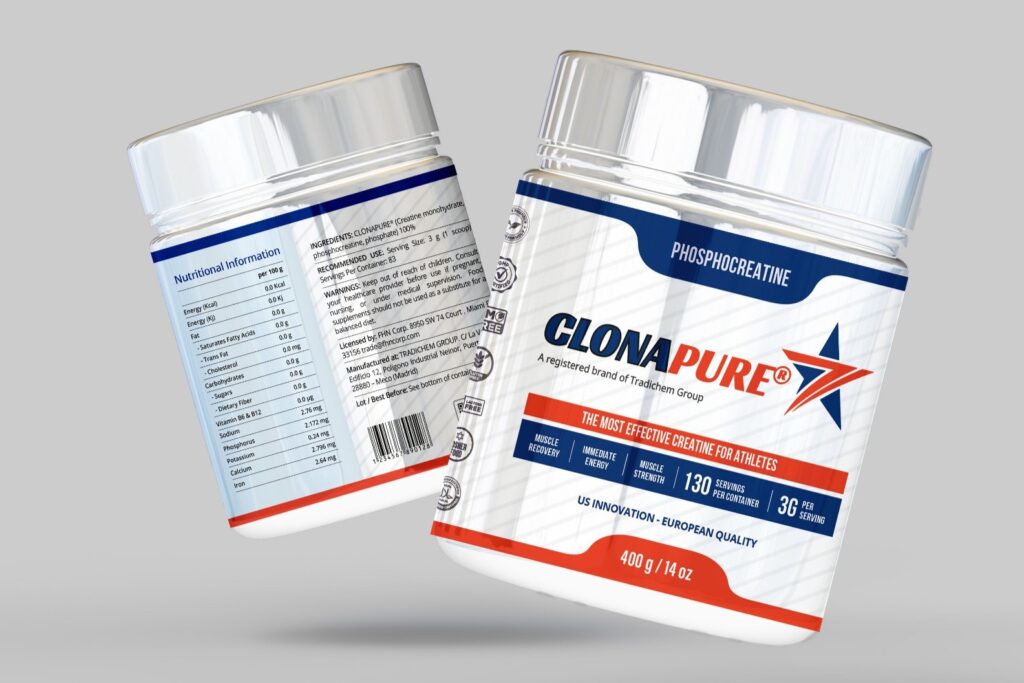Still one of the leading nutritional supplements on the market (and showing no signs of losing such relevant position), creatine is a naturally produced molecule that travels via the bloodstream to the muscles. An average adult produces about 1 gram of creatine daily, with the remainder coming from diet.
The active form, phosphocreatine, aids in forming adenosine triphosphate (ATP), the crucial energy molecule for cells. During exercise, ATP breaks down to generate energy. By boosting phosphocreatine levels, creatine allows for higher ATP production, enhancing performance during high-intensity activities.
Well, this is just a short summary of what creatine is and the basic way it works in the body. It’s time now to analyze the different ways creatine intake can benefit you and your performance.
Enter THE MANY FACES OF CREATINE!

ITS ROLE IN ATHLETIC PERFORMANCE
Perhaps the biggest asset of creatine as supplementation is its remarkable impact on athletic performance. In order to understand it better, let’s say that creatine works on three levels.
To begin with, intense workouts increase your oxygen needs. Creatine reduces this demand by utilizing phosphocreatine in your body, enhancing performance in endurance activities. Furthermore, exercise intensity cannot be sustained indefinitely. Creatine boosts your capacity to maintain this intensity, improving peak performance during workouts and sports.
Last but not least, glycogen stores deplete quickly during intense workouts. Creatine helps replenish these stores, enhancing performance and speeding up recovery by promoting better cell health.
Now that creatine’s workings are more clear, let’s go further into the specific ways it improves athletic performance.

MUSCLE STRENGTH AND ENDURANCE
Creatine offers a major benefit by boosting strength and power during workouts, which results in noticeable performance gains for high-intensity activities. As we mentioned earlier, using creatine while exercising helps to quickly restore ATP levels. This replenishment is crucial for strength training sessions, usually lasting under 30 seconds and performed at high intensity.
Again, science backs ups all these features. Research shows that short-term creatine supplementation can boost maximal power and strength. It enhances performance in high-intensity muscle contractions, improves sprinting abilities, and increases work output in repeated sprints. Athletes can gain up to 15% in muscle strength with this supplement.
When discussing muscular endurance —the ability of our muscles to keep performing before feeling fatigued—, the aforementioned role of creatine in enhancing glycogen levels becomes significant. This enhancement ultimately leads to improved performance and faster recovery, thanks to its positive impact on cell health.

creatine in sports
It is frequent for athletes and non-athletes to take up sports as part of their training routines. Considering everything we have just analyzed, creatine can be of great use regarding maximizing performance in this field as well.
There are many specific examples to be found (as explored in this previous article and this other one), but we will just check a few instances. For starters, creatine can enhance your offseason cycling training by boosting muscle mass and strength, improving ATP recovery and sprint performance. If basketball is your sport, creatine can elevate your game by enhancing high-intensity training results, sprinting, vertical jumps, and overall agility.
But wait – there’s more! Soccer players also gain from creatine, benefiting anaerobic performance and endurance. In swimming, creatine is proven to enhance strength training, muscle growth, and recovery.
As we said, this is just a sample. Feel free to explore further applications of creatine in sports like rugby, hockey, and baseball in the aforementioned articles.

DIETING WITH CREATINE
Creatine plays an interesting role in dieting since it adapts smoothly to many of the most common models. For instance, if you are following a Paleo diet, you’re likely consuming a good amount of protein. As long as you stick to the recommended creatine dosage of 3-5 grams per day, adding it to your routine is completely fine. Another example is intermittent fasting, where is does not even break the fast. Since it has no calories, it won’t trigger an insulin spike, making it a suitable option during fasting periods.
Creatine also pairs well with low-carb diets, as it has been shown to help lower triglycerides and may reduce fat accumulation in the liver. Additionally, there haven’t been any negative effects reported when using creatine alongside the Mediterranean diet either. If you’re interested in learning more about creatine and its compatibility with different diets, feel free to explore this article where we explore the issue more in depth.
being vegan with creatine
As we have seen before, creatine comes mostly from meat fiber in animals. It is for this reason that the levels of creatine in the muscles and bloodstream in vegans or vegetarians are generally lower compared to those who consume meat. Taking creatine supplementation can help enhance your vitamin B12 and creatine levels, leading to increases in body mass and strength, along with some added cognitive benefits.

phosphocreatine is key
Remember creatine’s active form we talked about briefly at the beginning of our article?
While performing high-intensity workouts, our muscles tap into phosphocreatine right away. This quick energy source is vital, enabling athletes to go all out from the very beginning. Phosphocreatine is essential for our muscular system, primarily by helping produce adenosine triphosphate (ATP).
ATP is crucial for muscle contractions and supports all our physical activities. When a person’s heart rate reaches 80-90% of their maximum, the demand for oxygen often exceeds what’s available and the body pivots to alternative energy sources, with phosphocreatine fueling said contractions.

what is the best use of creatine?
Just as important as using creatine as a source of supplementation is to make the best possible use of it. Recent studies have proven that including phosphocreatine in a formula along with creatine monohydrate increases its efficiency in augmenting ATP levels by 10% compared to just using regular creatine monohydrate.
Clonapure® offers this distinctive formulation designed to deliver quick energy to your muscles. Manufactured in a cutting-edge, GMP-certified facility, Clonapure® maintains a strong dedication to purity and quality, which is thoroughly validated through extensive HPLC testing processes.
It may just be the perfect time to enjoy all the benefits of Clonapure®!




